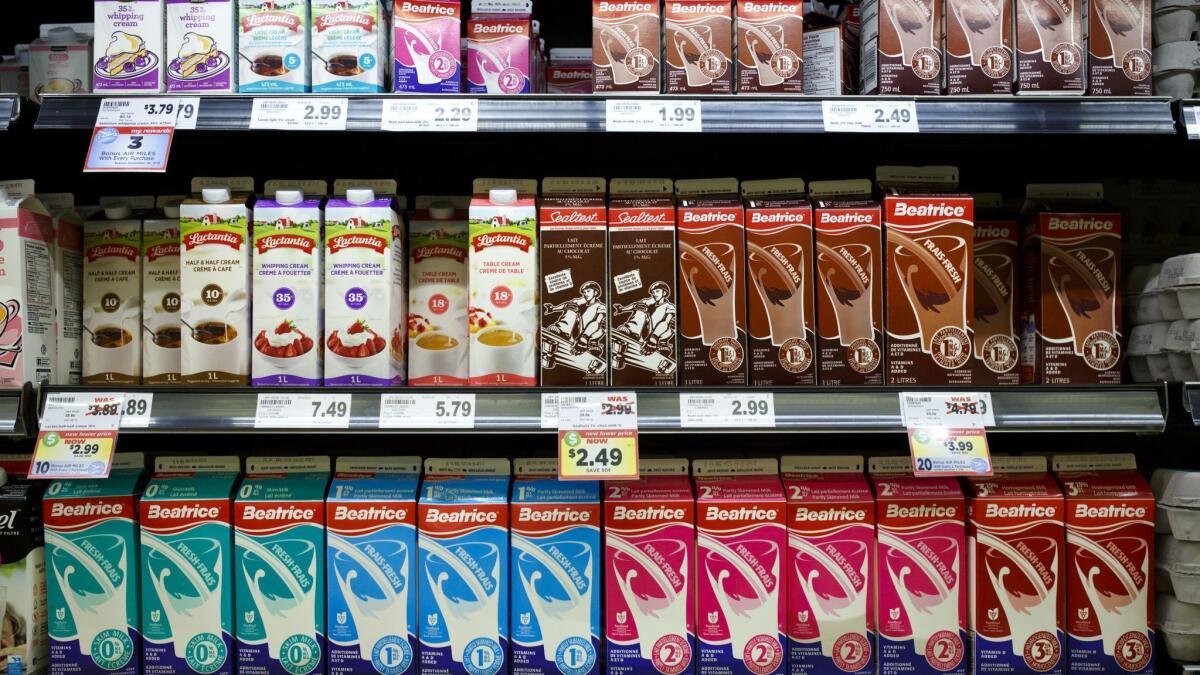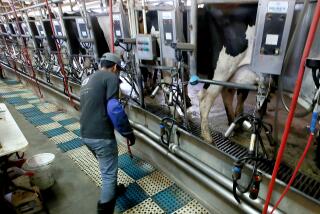Trump’s NAFTA revision pries open Canada’s dairy market

Dairy farms in Trump country won back a multimillion-dollar trade niche with Canada under a revised agreement with the United States’ northern neighbor.
Wisconsin and upstate New York will be able to resume exporting milk products used mostly in cheese and yogurt production under terms of the revised trade agreement announced Monday.
During a Group of Seven summit in June, President Trump railed against tariffs, some higher than 300%, that Canada imposes on several categories of U.S. dairy exports, including ultra-filtered, high-protein milk and milk powder, a niche market valued at roughly $100 million that is centered in border dairy states such as Wisconsin and New York.
The complaint about Canadian tariffs has been a steady rallying cry for Trump since his electoral campaign — he won Wisconsin, and despite losing New York to one of its former senators, Hillary Clinton, Trump handily swept rural upstate counties. Trump returned to Wisconsin last year to unveil his “Buy American, Hire American” executive order aimed at giving domestic manufacturers preference in government contracts.
Last year, Canada effectively cut off millions of dollars in dairy trade from those two states by extending its strict supply management rules to cover the ultra-filtered dairy products known as “Class 7” milk. Canada’s exports of these products soon tripled, according to the National Milk Producers Federation, a U.S. group.
The win for one niche of dairy exports, however, was not extended to all others — Canada will retain its ability to limit imports of dairy products under a supply-control system it has used to protect domestic producers. That system was left largely intact by the original North American Free Trade Agreement that the Trump administration has been renegotiating.
Canadian dairy industry officials said U.S. producers would be able to export their dairy products to Canada without tariffs until they equal 3.59% of domestic Canadian production.
That small opening is slightly larger than what would have been granted to U.S. producers under the former Trans-Pacific Partnership, a pact among 12 Pacific Rim countries from which Trump withdrew in the early days of his administration. Analysts had predicted the pact would boost U.S. agricultural exports by $7 billion annually.
In January, Canada signed a revised version of that deal with Japan and nine other countries that would open a market equal to about 3.25% of its domestic production.
“The outlines of the NAFTA pact remain intact, which will allow the U.S. agricultural sector to continue developing new international markets for our farmers,” said Tom Vilsack, a former Agriculture secretary who heads the U.S. Dairy Export Council. “We also need to pursue new free trade agreements with other nations and resolve our trade conflicts with China. It is imperative that the United States remains an integral player in driving the global trade agenda.”
U.S. dairy still faces steep retaliatory tariffs from two of its top trade partners — Mexico and China — that were enacted after the Trump administration began dunning imports of steel and aluminum from those and other countries.
“The administration spent a lot of time and energy to get to this point,” Vilsack said. “Now, they can direct their attention to steel and aluminum, so agriculture can get some release from these retaliatory tariffs.”
Those tariffs have sapped the momentum that dairy and the rest of U.S. agriculture had acquired in expanding its markets in China and elsewhere, and allowed competitors an advantage in claiming a bigger share, Vilsack noted.
U.S. producers sold $1.2 billion in dairy products, predominantly cheese, to Mexico in 2017, and $577 million to China, according to the dairy export council.
Despite tariffs, Canada has been the second-biggest foreign market for U.S. dairy products, behind Mexico — it bought $792 million of U.S. cheese, milk protein isolates, butter, whey and other milk derivatives last year, according to the export council.
Canada exported $149 million worth of dairy products to the U.S., according to the Canadian government.
Mexico, Canada and China are crucial markets eyed by the U.S. dairy industry, which exports about 15% of its production and is looking to boost that figure to 20% by 2020.
Overall, U.S. agriculture breathed a collective sigh of relief Monday at the prospect of preserving the trilateral trade that has greatly benefited farmers and ranchers. The U.S. Grains Council, which credited NAFTA for an “explosive” growth in exports of corn and other commodities, lauded efforts by the Trump administration to salvage the treaty, which Trump had once threatened to scuttle.
“No trade agreement has had more impact on our sector than NAFTA, which prompted explosive growth in our export sales to both countries as well as the development of a fully integrated grains and livestock supply chain within North America,” the council said in a statement.
Americans for Farmers and Families, a U.S. industry group formed to preserve NAFTA, said the accord with Canada was a sign that Trump “took our appeal to heart.” The group said the U.S. agriculture and food sector exported $44 billion to its NAFTA partners last year.
California, which is about twice as reliant on agricultural exports as other states, exported $1.4 billion of dairy products in 2016, about 12% of which went to Canada, according to the state Department of Food and Agriculture. Growers in the Golden State are still smarting from China’s retaliatory tariffs, particularly those on almonds and other nuts.
“We’ve seen California farmers, ranchers and agricultural marketers lose sales because of the retaliatory tariffs from Canada, Mexico and in particular from China,” said Jamie Johansson, president of the California Farm Bureau Federation. “Until those tariffs come off, farmers won’t see the full benefit of the new U.S.-Mexico-Canada agreement.”
Follow me: @LATgeoffmohan
UPDATES:
2:15 p.m.: This article was updated with additional comments from the U.S. Dairy Export Council’s Tom Vilsack.
This article was originally published at 11:40 a.m.
More to Read
Inside the business of entertainment
The Wide Shot brings you news, analysis and insights on everything from streaming wars to production — and what it all means for the future.
You may occasionally receive promotional content from the Los Angeles Times.







